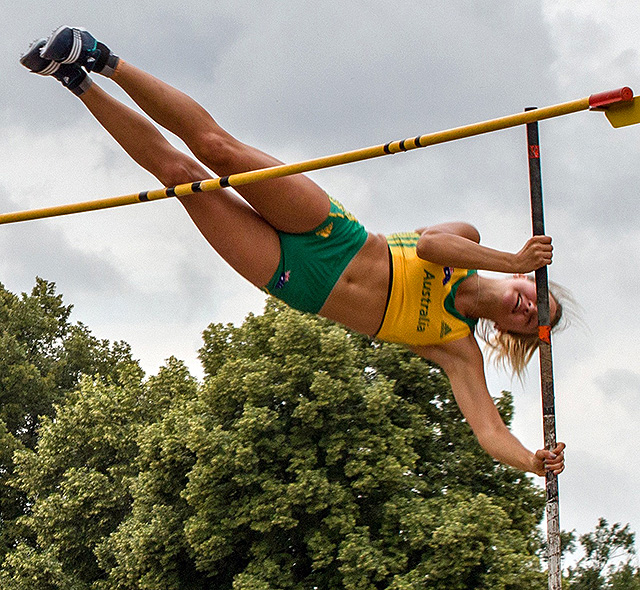Australia is one of the strongest competitors in the Olympic Games, and is one of five countries to have been represented at all Summer Games (the others are Greece, Great Britain, France and Switzerland). Australia has not always participated under their own flag - they participated in 1908 and 1912 as part of a combined Australasia team with New Zealand. Australia have also hosted the Summer Olympic Games twice - in Melbourne 1956 and Sydney 2000, and will again host the event in Brisbane 2032.
 Australian pole vaulter
Australian pole vaulterAustralia's first time to join the Summer Games was in 1896 Athens when they sent a single athlete, Edwin Flack, who took home two gold medals from Athletics. That was one of the strongest outings of Australia at the Olympics. The next Summer Games held in Paris, France, they sent a total of three athletes who took home a total of five Olympic medals. Swimmer Frederick Lane took the gold for both 200 meter freestyle and obstacle event. Runner Stan Rowley took the bronze for 60, 100 and 200 meters.
From that point on, Australia have sent a delegation to the Summer Games under its own flag except for 1908 and 1912 wherein they were part of the Australasia delegation. Australian athletes have consistently brought home Olympic honors except in 1904. Australia has even hosted the Games multiple times (1956 and 2000) and their athlete remains one of the forces to be reckoned with in many events.
Australia has also been a consistent participant in the Winter Games. They first joined in 1936, missed the 1948 Games and have never missed a single meeting since then. Australian Winter athletes did not fare as well as the Summer Games and their first Winter Games honors came in 1994 when their short track speed skating team took the bronze in the men’s 5000 meter relay in Lillehammer, Norway. Their first gold in the Winter Games came in 2002 when skiers Steven Bradbury and Alisa Camplin dominated the men’s 1000 meter short track speed skating and freestyle skiing respectively in Salt Lake City, Utah, United States.
Trivia
- In the 1908 and 1912 Games, athletes from Australia and New Zealand competed together as a single team, which was designated Australasia (ANZ).
- The first women's swimming gold medal was won by the Australian Sarah 'Fanny' Durack, who won the 100m freestyle in 1912.
- Australian Daniel Carroll won gold in rugby at the 1908 Summer Olympics playing for Australia, and also won gold while playing for the United States at the 1920 Summer Olympics.
- The Olympic torchbearer for the 1956 Olympics was a virtually unknown 19 year old at the time he carried the torch into the stadium at Melbourne. Ron Clarke went on to become the world's finest distance runner in the 1960s.
- Bob Windle is relatively unknown, but has a prominent place in Australia's fine 1500m swimming record. He won the event in 1964, in an Olympic record time of 17min 1.7seconds.
- In Sydney, 2000, Aboriginal Cathy Freeman lit the cauldron at the start of the Games, and went on to win the 400m race.
- In 2000, 17-year-old Ian Thorpe won four medals (three gold) in swimming, breaking his own world record in the 400m freestyle.
- Australia's best ever medal tally was at the Sydney Olympics in 2000 with 58 medals (16 gold, 25 silver, 17 bronze)
- In 2008 in Beijing, BMX was added to the Olympic cycling program. Representing Australia was a rider called Kamakazi, a Queensland BMX champion who changed his name from Jamie Hildebrandt by deed poll.
- Equestrian athlete, 66 year old Mary Hanna from Australia, became the second-oldest female Olympian of all time when she competed at the Tokyo Olympics in 2021, her fifth appearance at the Olympic Games.
Related Pages
- Why is Australia So Successful at the Olympics?
- Australia at the Winter Olympics
- About the Australasia team at the Olympic Games
- About every Country at the Olympic Games
- Australia at the Olympics Quiz
- More details about Australia's participation at the Olympics
- Melbourne Olympics 1956
- Sydney Olympics 2000
- About Sport in Australia


 Current Events
Current Events